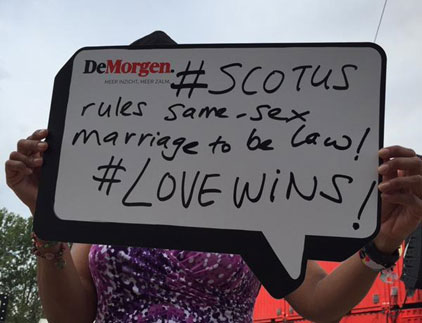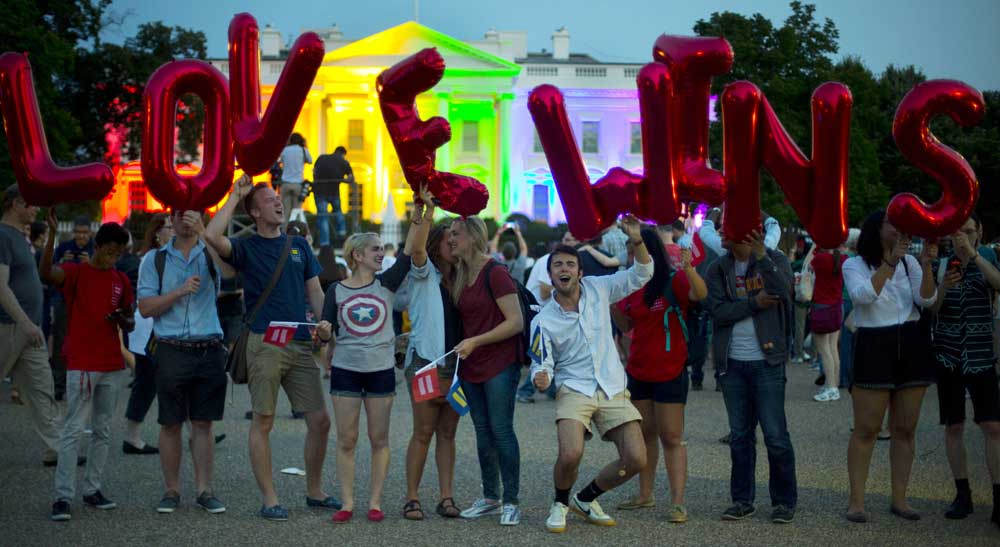On the 26th of June 2015, after 11 years of hot debate, the Supreme Court of the United States of America (SCOTUS) passed a law that stated that gay couples have the right to get married. The vote was close, 5 to 4, but now, two consenting adults of either sex can get married in the US. To deny them this is against the law. In support of this decision, Justice Anthony M. Kennedy wrote "No longer may this liberty be denied. No union is more profound than marriage, for it embodies the highest ideals of love, fidelity, devotion, sacrifice and family. [The challengers] ask for equal dignity in the eyes of the law. The Constitution grants them that right."
As expected, this decision resulted in both jubilant, tearful celebration, as well as outright outraged resistance. It exploded all over social media, with rainbow hued profile pictures, and the hashtag #LoveWins, which is how I learnt about it at a rock festival in Belgium.
But what is the implication of this decision? Why is the SCOTUS decision such an important milestone in the history of the US?
To understand a bit of the background, I asked Kerry Hartington, of Hartington & Associates, based in New Jersey. She explained to me that the SCOTUS is the highest authority in the land, so anything that the Supreme Court dictates has to be followed by every state, without exception. Previously, the legality of gay marriage varied state-by-state. Since marriage licenses were issued through the state, not the federal government, every state had the right to follow their own laws about marriage licenses. So, in some states it was legal and in some states it was not. The Supreme Court has now ruled that it is unconstitutional to deny gay couples marriage licenses, and all states have to follow the Supreme Court ruling, even if they don't like it.
Interestingly, Kerry (and indeed many others) drew a similarity between this decision to another one made in 1967, where the SCOTUS ruled that it is unconstitutional to prohibit interracial marriage, specifically in the case Loving v. Virginia. These were the days of people questioning with more and more authority the anti-miscegenation laws that had been put in place since before the formation of the United States. In this case, SCOTUS ruled that "Marriage is one of the 'basic civil rights of man,' fundamental to our very existence and survival […] To deny this fundamental freedom on so unsupportable a basis as the racial classifications embodied in these statutes, […] is surely to deprive all the State's citizens of liberty without due process of law. The Fourteenth Amendment requires that the freedom of choice to marry not be restricted by invidious racial discriminations. Under our Constitution, the freedom to marry, or not to marry, a person of another race resides with the individual and cannot be infringed by the State."
The essence of the words from 1967, and from 26th June 2015 is, to me, eerily similar. The premise is the same - prohibiting the marriage between gay and lesbian couples, or inter-racial couples, violates the US Constitution's 14th Amendment (which requires federal and state government apply all laws equally to everyone) and is therefore inherently discriminatory.
The sentiment of festivity was shared by the people I spoke to. R, an Australian who just happened to be in LA on the day of the ruling, told me that the feeling out in West Hollywood was electric. "My friends were both shocked and blown away by the announcement. They did not expect a ruling to happen so suddenly and they honestly did not think that it would actually be passed. I felt an incredible sense of pride for America and at the same time, felt ashamed to be Australian as our current (and extremely conservative) government is doing all they can to not allow marriage equality there. It's still an extremely highly debated issue in spite of the fact that the support for marriage equality is at an all-time high. While I know that marriage equality will happen in Australia and it will happen soon, I just wish that we weren't one of the last countries (If not the last) in the western world to allow this to proceed – I feel sad and let down by our government." Another friend, S, described almost word for the word the same feeling of celebration in New York City.
L, who was married in Massachusetts, the first state to legalize marriage equality, told me that the decision brought a sense of relief to both him and his husband, knowing that wherever they went or lived within the US, in all American states and territories, they would have the same rights as any married couple. "I think the most important aspect for me is that the decision brings equality of rights," he said.
So, what are exactly are these rights that were previously only available to traditional couples?
In the US, civil marriage is very important for a lot of legal processes. On the federal level, only married couples are able to file joint income taxes, to receive special tax credits for example. If one partner dies, the other is able to receive Social Security death benefits as a widow/widower. At a state level, only married couples are allowed to be on their spouse's health insurance, to inherit from each other when one dies, to adopt children, to go through divorce and divide property equally, and to visit their spouse in the hospital as well as make medical decisions on behalf of the other. With the legalization of gay marriage, gay couples can now receive these benefits and more.

For all the electric celebration in the US, the atmosphere in Europe was markedly less so. Even at my Belgian rock festival, my excited sign announcing it was largely ignored.
The Dutch are completely blasé about marriage equality - it is clearly old news here, especially since the Netherlands legalized same-sex marriage in 2001, and founded the COC, one of the world's first gay rights association. However, the picture is not quite as rosy as one might think – the struggle to real equality was a long, hard fight.
H, a former gay activist, now married with two kids, explained to me that setting the legal and social precedence was very hard work, even in the proudly tolerant Netherlands. Immediately after the legalization of marriage equality, a big struggle amongst gay couple was to find the right 'weigerambtenaar' – the official who solemnizes marriages on behalf of the city hall.
Several of these civil servants refused their services to gay couples. This was gradually solved by ensuring that every new weigerambtenaar that was hired would marry same sex people willingly. On top of this, law makers conveniently forgot that when people are married, children will be born. "I wonder how they will deal with the concept of the 'meemoeder' (the partner of the biological mother) in the US," H said. "In the Netherlands, we struggled for 10 full years to have our legal position recognized. Finally, after all this time, most issues are well arranged for us now, at least legally."
The problems did not end there for her however. Being in academia, it is expected for scientists to work abroad for a few years to ensure success in their careers. Because her marriage was not recognized in the US, she could not bring her wife to pursue her career there. Staying the Netherlands has greatly reduced her chances of having a successful scientific career. "Still, I am lucky," she said. "The consequence of being gay was not so big for me that I could not deal with it. This still does not hold true for all LGBT people here, where the suicide rates remain high."
More worryingly, M, who is in a relationship and has a child, mentioned to me that it is getting more and more difficult to be gay even in the Netherlands, especially with the influx of immigrants that are not quite as tolerant of one's personal choices. "It is of course worse for the men in a relationship – who can forget the stories of men being beaten up in Amsterdam for holding hands? And as a lesbian couple, we constantly get lewd offers from men. It is disconcerting," she said.
Looking at the Dutch experience, it is quite possible that legalizing marriage equality in the US is only the first step. While people are ecstatic at the moment, it is only one small piece of the overall acceptance and advocacy pie - there is a lot of work to do related to employment discrimination, hate crimes, child rearing, etc, especially taking into consideration the resistance from various groups. Real equality for LGBT people and couples might yet be an uphill battle.
Read also: A Non-religious Case Against Same-sex Marriage
and Gay Marriage Facts & Figures.

Sheba is a sometimes freelance writer, who works in scientific publishing, after a long stint in academia. Follow her on Twitter (@ShebaAJ) to hear more about her views on science, books, fitness and music.
Image: Same-sex marriage supporters hold up balloons that spell the words "love wins" as they stand in front of the White House, which is lit up in rainbow colors in commemoration of the Supreme Court's ruling to legalize same-sex marriage, on Friday, June 26, 2015, in Washington DC. (AP Photo/Pablo Martinez Monsivais)








